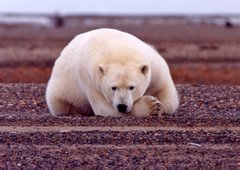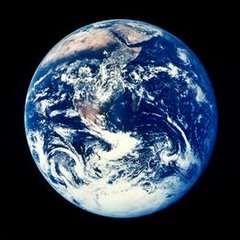Natives and scientists state their worries about climate warming
CLIMATE CHANGES: Rural residents feel impact, express concerns to committee.
By ELIZABETH BLUEMINKAnchorage Daily News
Published: April 14, 2007 Last Modified: April 14, 2007 at 05:51 AM
The day her toddler son demanded to eat maktak, the skin and fat of the bowhead whale, was unforgettable for Mary Sage, a young Barrow mother.
Keeping the Inupiat culture strong in her children is important to her. But the state's warming climate is throwing a monkey wrench in her family's future, she said Friday.
"How will our children and grandchildren feel when they are not able to hunt these animals anymore?" Sage asked.
All over Alaska, not just along the coastline, residents are noticing that the ice is ebbing -- with direct consequences for anyone digging in the ground, crossing the tundra or venturing out over ice to hunt.
A number of rural Alaskans flew or drove to Anchorage this week to tell their personal stories about a warming Alaska to a state commission the Legislature set up to take stock of climate change's consequences for Alaska.
"Less ice for us means less opportunity for food," Sage told the Alaska Climate Impact Assessment Commission on Friday.
The 11-member commission also heard from scientists describing how caribou, marine mammals, birds, fish and other species are shifting geographically. Some species could be in trouble due to the warming trend's effects on the availability of their food.
In the Northwest town of Selawik, villagers are worried about winter travel and hunting. Two years ago, the village lost two young girls and one man who fell through ice. The ice was considered safe in previous years, testified Hannah Loon, a part-time University of Alaska student who grew up in the village of about 850 and transmitted the concerns from one of the village's elders to the commission.
Teenagers and college environmentalists from Anchorage and Fairbanks also spoke. Many of the students asked the commission to tell the Legislature and Palin administration to start regulating greenhouse gas emissions in Alaska.
Hazel Apok of Kotzebue told the commission she is worried about less snow in the area surrounding Kotzebue harming future subsistence berry crops.
She shares the berries she gathers with other locals who want it for Eskimo ice cream. "Blueberries also help keep my cholesterol down," she said.
Safe hunting is a big concern in Barrow. With recent years of dramatic loss in the Arctic Sea ice, and scientists predicting more ice loss in the future, hunters and their families have immediate safety concerns, Sage said.
"Multiyear ice is thick and stable and preferred while conducting the spring whaling hunt. Young ice is thin and not so stable," explained Sage, whose husband is co-captain of a whaling crew.
Twice in the past 10 years, shore ice at Barrow became unstable and broke apart, sending about 160 whalers adrift in the Arctic. All of the hunters were rescued, but not all of their snowmachines, she said.
The last time the Barrow whalers had a similar event was in the 1940s.
Sage asked the commission, "How often will this reoccur? Will we be so fortunate as to save every whaler every time this happens? Will the ice be stable enough this year for whaling? How much longer will we be able to continue our traditional spring hunt on the ice?"
She mentioned another perplexing problem for some Barrow whale hunters: Umiaks, the sealskin boats used for spring whaling, are sprouting mold due to warmer weather.
"It is very expensive to change the cover of your umiak," Sage said.
Kathleen Carroll of Fort Yukon and Rita Buck of White Mountain described hitting water instead of permafrost when digging outhouse pits. That didn't happen in the past, they said.
The commission will hold a second public hearing in Anchorage, probably in the fall.
The commission plans to develop a complete overview of the likely impacts of climate change in Alaska and make recommendations to reduce harm.
Wednesday, May 23, 2007
Wednesday, May 2, 2007
House Bill 152 Renewable Energy Fund

The renewable energy fund bill HB 152 <http://www.legis.state.ak.us/BASIS/get_bill.asp?session=25&bill=hb152> passed the House unanimously on April 19th.
The next step is the Senate.
Urge your senator to support this bill and let them know you want it to pass by the end of this session. Find your senator's name and contact information here http://w3.legis.state.ak.us/legdist/24/legdist.htm.
**TAKE ACTION! /**Now is the time for you to write /*Letters to the Editor*/ and to encourage your own Senator to keep this important priority bill moving this year!
Check out Senator Ellis and Representative Thomas’ excellent Compass piece in last week's ADN, compass piece <http://www.adn.com/opinion/compass/story/8801530p-8702751c.html>.
submitted by Becky Baird, Northern Alaska Environmental Center
Subscribe to:
Comments (Atom)


